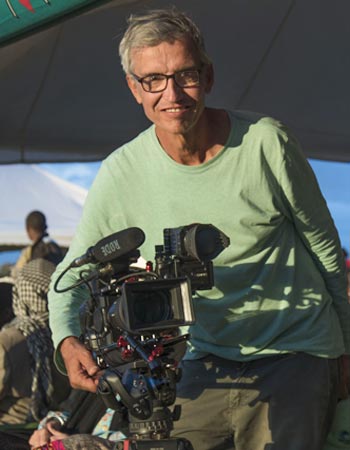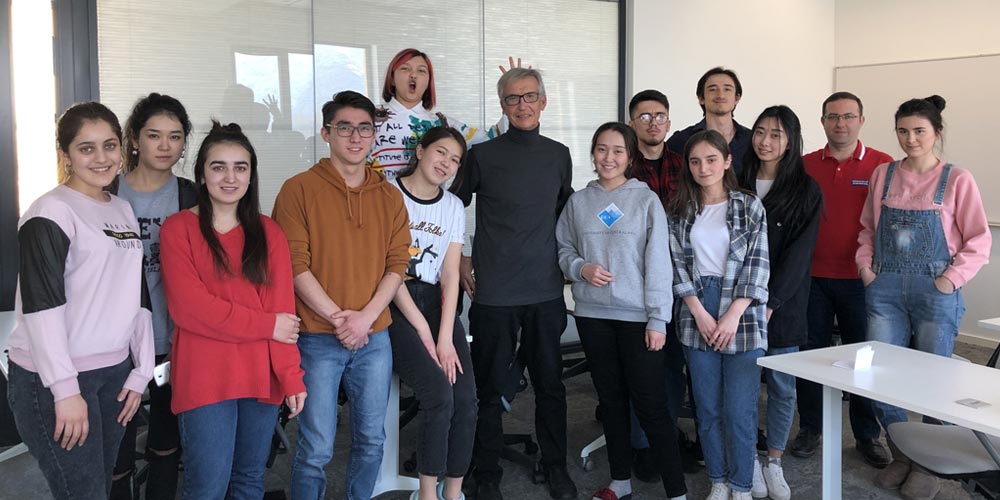Environmental films for public awareness - Andrew Tkach
 Andrew Tkach is the Executive Producer of the two environmental film series:
Giving Nature a Voice (GNV) and
Voices from the Roof of the World (VRW).
Andrew Tkach is the Executive Producer of the two environmental film series:
Giving Nature a Voice (GNV) and
Voices from the Roof of the World (VRW).
How did you get involved with these projects?
My involvement with AKU began in Nairobi, Kenya when AKU asked me to develop an environmental reporting program. The idea was to support and build capacity of local film makers and develop a series for television that would deal with various environmental issues affecting East Africa. That led to a successful four season run of 52 documentaries (Giving Nature a Voice) on one of the main TV channels in Kenya.
Later, the University of Central Asia requested me to do a similar program for the South and Central Asia regions. So, I went to Kyrgyzstan, where I also taught documentary filmmaking.
What has been the impact of environmental films?
I think people working in journalism strive to be objective, fair, and truthful, but at the same time, want their work to have an impact. Being a filmmaker involves some sacrifice such as getting paid little and going to difficult places. Regarding impact, most of the time it feels like pushing a rock up a hill and hoping it ends up being a force of its own.
Working with broadcast TV definitely amplified our reach and impact, especially in affecting social change.
Can you share some stories of impact or social change?
East Africa:
One of the films focused on the Lamu coal-fired power plant that had been proposed for a pristine region on the coast of Kenya and Somalia. If built, it would have been the largest coal-fired power plant in Africa. Lamu is a historical town and important in Swahili culture, so community organizations approached us to cover this story. Our film was used by the local community for screenings to spread the word. As a result of community backlash and media coverage, this coal-fired plant was cancelled by the government.
Pakistan:
Another story was called ‘Forest in peril’, made by a Karachi architect to save the mangroves of Bundal Island which were being cut illegally for fuel. After the film aired, we were informed that decisions had been made by local government organizations to protect the area.
These stories of impact are clear indications that you can help people and institutions make a positive impact in creating social change.
What were some of the challenges and learning during the execution process?
The biggest challenge for Voices from the Roof of the World was the remote coordination and execution because of COVID. Local film makers faced several challenges on the ground due to COVID restrictions. Some films had to be postponed due to travel and terrain difficulties as well as social circumstances brought about by the pandemic. These are now being released in the second season. There’s also the challenge of how to make television for the general public and that can be translated into three or four languages. Most filmmakers are purists and are more concerned with the quality and aesthetics of their product, and not necessarily in what's being said. I think films should stand out aesthetically while being watchable and understandable by the widest possible public to have an impact.

What is your personal motivation or inspiration for doing this work?
I have always been interested in environmental reporting. Even my college thesis was on asbestos poisoning in workers. That kind of launched me on a journalistic career. One story that put me on this particular path was when I documented Inuit hunters in northwest Greenland when the ice is melting in May. This ended up becoming a documentary called ‘On Thin Ice’. I then realized that this is so important that nothing else matters to me in my work. I thought that if you have a limited amount of time on this planet and in your career, you should use it for maximum positive impact.
What makes you hopeful about your work on sustainability?
The solution for environmental crises can only come from a worldwide wakeup call for action to save the planet, which has now happened. I believe that hope is the antidote to giving up.
Can you give us a preview into
Season 2 of VRW?
It will be a series of 10 documentaries, each produced by local filmmakers, including two filmmakers from Nepal (a new country addition). One episode will be broadcast online every Sunday beginning from 6th November. It will have Urdu as well as English and Russian versions. I'm hoping that it leads to a momentum that takes off on its own.

